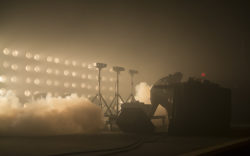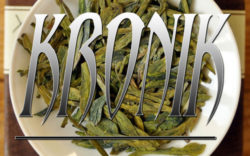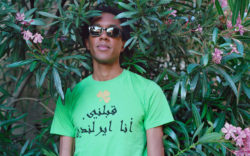Welcome to .ext e n s i o n, the electronic arm of Flagpole‘s Homedrone blog.
E+E is the name by which Virginia based artist Elijah Crampton is currently making music. The project incorporates hypnotic keyboard playing, both minimal and wildly obtrusive sampling, millennial pop vocals, and poly-ethnic rhythm tracks. While an amateur stew of these elements might end up in a predictable dance dish, Elijah’s work is imbued with a more affecting tone. From behind a uniquely textured curtain of Latin-commercial and backwoods-thug aesthetics, E+E is able to exude sound with ample room for you to reconsider your emotional preconceptions and generally feel more. Whether the elements originated as such or not, their product finds them melted into trance-inducing modern masterpieces.
Elijah works to seat truth at the front of each new piece. Which is to say, you may not get real worked up listening to Jeremih or The-Dream sing, but it’s practically unavoidable to be moved by how much he does. This sincere appreciation, illustrated by his compositions, allows the listener to get a different perspective and hear things anew. When love is true, it is creation. If one is willing to truly accept something, say Pop, this itself is a new form—a lens with the lover’s eye. Through it, we can see what he sees: beauty. Perhaps deeper levels of the content existed previously and one was simply not privy, but that’s not necessary. Sincere love itself is art. When Elijah finds warped melody in the crushing, lazer-laced, meta-masculine voice that pierces your ears between phrases of monster truck commercials, I get a contact high.
Flagpole caught Elijah on a trans-Atlantic flight to Virginia. He took the time to write us back these thoughtful words on his cell phone.
Flagpole: Where are you from and where have you lived since then? Where are you at now when you’re in the states?
E+E: I was born and grew up outside of Los Angeles, CA in the inland empire, moving to the countryside outside of Monterrey, Mexico—my family moved back and forth between Cali and Mex while my dad was attending theology school. Out of school I moved south to Tennessee, and then back to Los Angeles for a while before moving to Virginia, where I live now. I’ve basically lived all over the US, but those have been the places I’ve managed to stay the longest.

FP: How does it inform your work?
E+E: Moving around has had a big impact on my work, with one thing always informing another. It’s beautiful and I usually just go along with the process without taking time to dissect what’s happening. I’m like a dung beetle constantly rolling shit into this growing ball. For example, I’ve gotten into using a lot of Angolan drum tracks in my live set. At the same time I’ve been trying to emulate all these medieval style woodwinds I’ve been listening to lately, but my live keyboard playing is still very much in this Cumbia-jam style I picked up in LA. So this amalgam of Latin keys over African drums became another by-product of moving around.
FP: Has music brought more travel into your life? Do you feel a difference in cultural evolution from place to place? Does it make you think twice or inspire you to think anew about certain ideas or approaches?
E+E: I’ve always felt most like myself moving around, like I don’t question much when I’m leaving someplace. I think also because I’m a mutt (half Bolivian half American) I’ve never associated or felt like I had to cling to one culture in particular- I don’t think I ever really belonged to one distinct culture other than what i created for myself.
“It was kinda like Pretty Woman sometimes. There’s a photo of me walking down Rodeo Drive back then, somewhere on the Internet.”
It’s always been my natural motion to move depending on my spirit and what I feel I’m called to do by God, but more recently, moving around to perform, getting payed to go here or there, is a new dynamic I’m still working out. I mean, when I worked as an escort, I traveled a lot, but traveling for music is a whole different game. I’m not sure what to think of it yet. I just got back from a long trip to Europe last night, actually. It’s really good to be back in the States. Lately I’ve been overcome with this feeling like I don’t belong to anything anymore or like I never did. It’s been liberating and abysmal at the same time. I don’t know the full significance and weight of the issue yet. For now, I’m just thankful I can take a break from myself.
FP: How long ago was it that you were an escort? How’d you like it?
E+E: It was great. I was my own boss, and sometimes it felt like social work, like i was really helping this specific portion of the population. That was years ago when I lived in Los Angeles. I was a lot more selfish then and coming of age, trying to be true to myself, follow my own heart, but deal with all my shit and just try to survive on my own. It was kinda like Pretty Woman sometimes. There’s a photo of me walking down Rodeo Drive back then, somewhere on the Internet.
I was in and out of rehab and ended up spending almost a year at this Scientology-based center, where I really learned how to meditate. I’d sit there staring into space, alone, for days, months. I actually came to understand it (meditation) as a real state of being, as a new form consciousness. It changed who I’d become. When I was done after that year, I tried coming back to my life in L.A., but I had already become a new person, and the “old clothes” didn’t fit- I ran away to Virginia. Virginia has been a wonderful place for me. A new world—city life really doesn’t suit me anymore.
“It was like Gethsemane, I can’t really explain it—a true revelation. My life was changed for good.”
FP: Much of what you do has a very spiritual feeling to me. Are you religious? Do you ever work with religious content as a device, or is it simply a part of your life that comes through?
E+E: I guess I am. I’ve always been really close to my spirituality, I think largely in part due to my mom’s side of the family, which has a strong history with that sort of thing. Being raised Adventist in the ’90s, there was a big emphasis on end-time prophecy and the Apocalypse. I was raised to pay attention to my dreams and that apocalyptic flame will always burn inside me.
It was just this year that I feel I was truly born again though. Not just brought to a new outlook on God, which happens, but ultimately reconciled to Jesus, to the blood of Christ. It happened with a visit to Paradise, CA earlier this year. It’s this place in northern Cali where the Sierra Nevadas meet sequoia forest and olive groves. It was like Gethsemane, I can’t really explain it—a true revelation. My life was changed for good.
As far as using my religious beliefs as a tool, I think that is something I’m still working out because my understanding of God is always changing and growing. Music is definitely tied in deeply with my concept of and relationship with God. Everyday I pray that I might create something beyond myself, somehow answer to a will beyond my own within my work; fulfill something beyond what I set out to do. I rely constantly upon God’s grace to flow through my practice, which has required faith, humility and diligence on my part.
FP: Does sexuality play an intentional part in the work?
E+E: I think sexuality naturally does that without any effort on my behalf. There is so much difficulty just being human in general, I try to hold myself to a standard of individuality based in honesty, freedom, purity of heart. I try my best to be an example in this regard, especially now that I’m getting older.
FP: Some of the source material you use really gets me in a trance. There is a level of what ends up feeling like modern classical to me. Can you tell me about some of it, and your goals in using it?
E+E: In the past months I’d been moving further into this free-for-all, collage style of composition, but recently with performing live again, I started moving back to more regular performance-based work, so it’s like now I’m arriving somewhere between these two methods of writing music, finding a workable median.
I grew up studying classical piano. I still notate some of my work if I find it necessary to save it that way, but my abilities are pretty rusty now and it takes me a while just to hand write a small amount of sheet music. I also grew up playing in garage bands; it’s where my real love for music came apart from the classical studies. I just had so much freedom to experiment and do what I wanted while playing my own music.
FP: Do you ever use humor in your work?
E+E: I think I do. I was talking recently with a friend of mine who shares a lot of aesthetic similarities with me and he described what we’re doing as romantic comedy. I’ve always liked that as a genre for music, as a way of explaining what I do. Because there is a natural sense of humor attached to the work, in spite of myself.
FP: I identify heavily with parts of your visual aesthetic. Some of the lifestyle brand imagery may come across as ironic to some people, but I sense you have a more real relationship with this type of imagery. Do these things relate to your personal identity?
E+E: Yea, I’ve always been chronically serious, always believed that there was an innate seriousness to everything. The things I love and appreciate, it’s natural for me to approach them with a certain degree of reverence. I never really understood irony—I think because genuine understanding and meaning were so important to me. I was a pretty humorless kid. But humorlessness can be pretty funny in and of itself.
FP: How do you approach the combination of elements in your work? You seem to be able to incorporate a very wide spectrum of harsh culture.
E+E: With balance, its a matter of design, like all art. And the goal for me has always been, “How deeply can I elaborate my own world?” I feel I’ve been working with the same palette for years, but it’s my techniques that I’ve sharpened in order to better detail my own language with the music. It’s a process of concrescence that requires time and endurance, belief in an ultimate beyond. Ellen White described heaven as being “a ceaseless approaching unto God” and I think that is the ideological basis for my compositional endeavors.
“I never really understood irony—I think because genuine understanding and meaning were so important to me.”
FP: How do you feel about the Internet in social and artistic terms? Do you like the mystery it can provide?
E+E: Well, in my work, I wouldn’t be able to accomplish the things I do the way I do them without it. It’s kinda like air or water or fire—you just use it according to your own will and try to work the best you can with it.

I think it’s really absence of Internet that provides the mystery—the Internet is like water or blood trying to fill the veins of the invisible at all times, it creates its own space and reality this way. I guess I’ve managed to utilize some of that huge idea in what I do with music. I mean, the way I’ve been writing, I’m like a grave robber stealing limbs from here and there to throw them on this slagheap and muck them into a new beast- and that less than noble task can become something beautiful or uglier or truer or simply more naked, which demands to stand singularly and new, separate from the original crypt that housed it. The limb or segment or torso, etc., and I believe I can take credit for this new beast. I mean, I’m sure Dave Grohl or Mafiaboy or Rihanna couldn’t see him in the trashcan, but I could—he was mine, like I am God’s, he (the creature) belonged to me. I think it’s important that people know I work and deal with the drain hole of the mortician’s sink. Golgotha is my business and my workspace is the trash bin. Beyonce, Red Hot Chili Peppers, Steve Reich, whatever—it’s all fair game to me when I’m digging through the trashcan.
FP: How did you meet Ashland Mines and how much do collaborations like that impact E+E? Are there other people you’ve been collaborating with recently?
E+E: We met a while ago when I was living in L.A. He was homeless and I had just quit school, and we both didn’t drive, so we were on the street a lot. I’d wanted a real percussionist for my band, one that could effortlessly blend the styles of drumming I was so in love with at the time—Huayno, Reggaeton, Kuduro and Cumbia, to name a few. We actually never wrote much work together, and most of what was started remained preliminary and conceptual. He’s become my brother, still a big inspiration for me of course. With collaborators, I’ve kind of organized my own team over the years. I’ve brought everyone together again to help me on a new EP I was asked to do. I’m very excited to work with them again, they’re my secret team.
FP: You’ve performed on bills with an array of interesting artists recently. The only common thread, which I guess applies to any “party,” is dance. I love the rhythmic work on your recent recordings. How do you connect with dancing in your life? How do you feel about that party or club zone?
E+E: Although I’m influenced by elements of club music, I find myself less and less interested in the whole notion of parties and club culture. It simply isn’t my arena. When I was a little boy, I’d play out stories by moving my body to the actions and shifting gazes in my mind. It wasn’t until years later that I realized what I was doing then was a form of dancing. I’ve noticed the older I get the less dancing in the standard sense—moving one’s body, etc.—appeals to me. I’ve found myself returning to something altogether more basic and elaborate. Music composition itself has become a new dance for me, perfect in that its formulation comes unbound by the limitations of my physical form.
Like what you just read? Support Flagpole by making a donation today. Every dollar you give helps fund our ongoing mission to provide Athens with quality, independent journalism.










